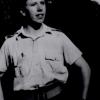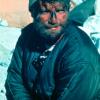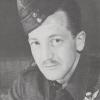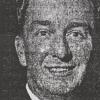I was conscripted in February 1940, and joined the Royal Warwickshire Regiment 2nd Battalion, we did three months training in Wales. We were then kitted out and expected to reinforce the 1st Battalion outside Dunkirk who were having a hard time of it.
With the evacuation of Dunkirk commencing this was cancelled and I, with my trusty 303 Lee Enfield rifle that I had only fired 5 rounds from, was sent to the South Coast near Plymouth to man the coast line. Here, I was selected by Colonel Hicks as Body Guard and Batman Driver for him. In due course he was taken up for a special service unit and asked me if I would consider volunteering. The fact that there was a pay increase of an extra one shilling and threepence a week was a great attraction.
Early in 1941 we finished up under canvas on a very wet and boggy moor near Launceston, Cornwall. I got a compassionate 24 hour leave when our home in Belgravia was bombed out. Fortunately, Vera had joined us previously because where she was living in Westminster had been encircled by unexploded bombs. HQ was in part of a country house and Colonel Hicks asked if Vera would like to join his wife, and asked if she could cook, eventually she had to produce a Dinner Party for thirteen people including General Montgomery, Browning and others of the top echelon that formed the 1st Airborne Division.
We went to Ringway for jump training, but finished up with only receiving ground training and a ride in a very floppy aircraft which tossed us about to find out our reaction to flying. Returning to Bulford one evening we found ourselves involved in a big evening exercise down over Hampshire. We ran into fog and at that time there was no means of communication between the towing plane and the glider. This meant that if they got out of line they just cast us off with no warning. We finished up that night with half the glider wings in a row of trees and found that we had ploughed a farmer’s field for him. He took us down the pub to thank us in spite of it being well past closing time.
The call came for us to go to Africa and we were rushed off onto the Stirling Castle to cross the Bay of Biscay. The water was lousy with subs and it meant we had to take turns 4 on and 4 off round the decks to keep watch. Eventually we made port at Oran and travelled by trucks right along the coast to Sousse, finishing up in an olive grove at Mesaken to prepare for the invasion of Sicily.
The day arrived and fortunately before the ammunition dump went up we had managed to get all we required and took off about 6.30pm in clouds of sand. We were in Wacco gliders and were towed by DC 47s with American crews. The weather turned foul with heavy head on winds 300 miles across the Mediterranean Sea, ‘it was no picnic’. Then, over Malta there was some irregularity with the recognition signal and the flak starting to come over. Our glider was cast off too early and could not make the cliff tops, we finished off about a mile out of Syracuse Bay, and whilst sitting on the wings taking off our boots, we were given a very warm welcome by the guns on each corner of the bay.
The shore appeared a long way off for a poor swimmer, but three of us finished up in a cleft in the rock face about 100 yards away from an anti aircraft gun. The typhoons came in and we were put out of action, the Green Beret boys made their landing shortly after that. We waited until daylight and joined them, taking the boots and rifles from the prisoners they had.
It was thought that 5 gliders had reached Sicily, 3 landed on the LZ. When we went through the following morning the tail of one of them was stuck well up in the air, indicating a very rough landing adjacent to the objective, a stone road bridge. Three mutilated bodies of our chaps were propped against the wall with their intestines hanging out. It was said that our Padre and some of the boys had been put in a Pill Box and a grenade had been tossed in.
It is known that 69 of us left from Africa in that operation and just 19 returned.
When we arrived back, our seaborne tail was in transit to Tarranto to take part in the chase of the Germans up the west coast of Italy. I returned with Colonel Hicks and finally got to HQ established at Bari having had very little sight of the enemy. We were fortunate, and arrived back in England for Christmas after a very long journey across the Atlantic in one of the Strathaird Liners.
After many cancelled briefings for operations, on Sunday 17th September, 1944 we finally boarded the Horsa gliders and were the third to arrive at the LZ in Holland. We quickly unloaded our hand cart and got onto the road only to meet up with the German Tanks at Wolfheze. The poor bloke with the PIAT gun had no chance of success, so we just had to make for cover. HQ did in the end get established for the night at the White House Hotel, but came under fire in the morning. Apparently there was no chance of getting to Arnhem, therefore we took up positions and formed part of the perimeter in the woods east of the Divisional HQ at the Hartenstein Hotel. The frustration was evident for we were pounded with heavy tank fire and anything else they could find to throw at us, then when the multiple mortars kicked in we had to dig deeper. The little area I was in had one attempted break through by the Germans and we lost the PT Sergeant Major, who was right next to me on the ground after he caught a bullet in the throat.
When Major General Urquhart went missing from Divisional HQ, it was necessary for Colonel Hicks to take over, being the senior officer I quickly dug a slit trench there and got a bit of sleep that night. When I got back to my Geordie mate in our defence spot, he was not at all happy having been awake all night and of course the hunger factor was starting to creep in on all of us.
By the night of the 26th the withdrawal commenced. It was a dismal sight to see us crouching down along the marshes to get onto the pontoon boats that the Canadian had gallantly got up to the Lower Rhine. I only remember being bodily picked up and thrown into what the chap said to me was the last boat over. It was just a matter of then keeping within the lines of tracer bullets they kept firing from way back in the rear until you got to the check point where Colonel Hicks was doing the job of organising trucks to take us back to Nijmegen.
I fail to see that General Browning was correct in stating that this operation was 85% successful, communications broke down because of the radios being used, the LZ’s were miles too far from the main objective, and even when the British Tanks were able to get over the Nijmegen Bridge, Horrocks let them sit brewing up tea while we were getting the hell knocked out of us just ten miles up the road.
I returned to Neatheravon Airdrome on Salisbury Plain where Brigadier Hicks became Administrator of the School of Air Support, and I was sent to the transport section.
In March 1945, the Brigadier with 2 Air Force officers, 2 other ranks and 3 125cc motor bikes were emplaned in a DC47 our final destination Burma via Marseille, Malta, Tobruk, Cairo, Shiaba, Sharta, Karachi, Bombay, Colombo, Madras, Calcutta, and Rangoon. We returned in one month.
I was demobbed or released to Army Reserve in May 1946 with a new suit, shoes, Mackintosh, a Trilby hat and pay for Leave due.
The Brigadier presented me with a silver cigarette box inscribed ‘Rouse from the Brigadier July 1940 – January 1945’.
I was rehabilitated onto Post Office Telephone and one of the jobs I was given was to retrieve 150 pound copper wire that was urgently required from 60ft poles during the English winter, ‘very cold and very slippery’.
Vera and I left England in February, 1952.
Source: Ron Rouse
Read More




Latest Comments
There are currently no comments for this content.
Add Comment
In order to add comments you must be registered with ParaData.
If you are currently a ParaData member please login.
If you are not currently a ParaData member but wish to get involved please register.